You are a visionary, eager to implement some groundbreaking ideas and build great products. Or perhaps, a tech enthusiast, totally aware of the fact that businesses of the future will be empowered by technology. Whichever is true, the best books for tech entrepreneurs help to bring your precious brainchild to life. And time waits for no one.
The books below, though relatively new, have already gained a great deal of attention and acclaim – written by successful entrepreneurs, tested and verified on real-life business cases.
So let’s dive in without further ado.
List of the best books for tech startups (our experience)
Crossing the Chasm: Marketing and Selling High-Tech Products to Mainstream Customers, by Geoffrey A. Moore (1991, 2001, 2006)
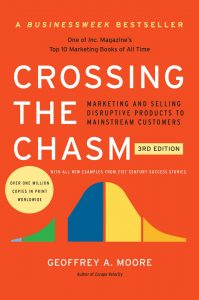
Why should I read it
Best tech startup books build your awareness of the main pitfalls in business growth. However great, your product alone will never ensure your business success. Marketing is crucial. And finding your customers, cultivating them, getting them to love your product turn out none the less challenging. You will have to take more than one leap of faith on your way to finding a product/market fit. That’s the ‘chasm’, described by Geoffrey Moore, following Everett Rogers’ idea of Technology Life Cycle Adoption Curve.
A quarter of a century later, the message still remains relevant.
Key message
There are five different types of customers that a successful entrepreneur deals with over time:
- Innovators
- Early adopters
- Early majority
- Late majority
- Laggards
And to reach out to every new group, you have to cross a chasm, which is the largest between the ‘early’ and ‘mainstream’ markets. It means that, compared with early adopters’ acquisition, you need to develop a completely different marketing strategy to win mainstream customers.
Key quotes
- “The key to getting beyond the enthusiasts and winning over a visionary is to show that the new technology enables some strategic leap forward, something never before possible, which has an intrinsic value and appeal to the nontechnologist.”
- “The number-one corporate objective, when crossing the chasm, is to secure a distribution channel into the mainstream market, one with which the pragmatist customer will be comfortable.”
- “Surround your disruptive core product, the thing that got you to the dance, with a whole product that solves for the target customer’s problem end to end. That will keep you on the dance floor for a long time to come.”
The Four Steps to the Epiphany: Successful Strategies for Startups That Win, by Steven G. Blank (2006, 2007, 2013)
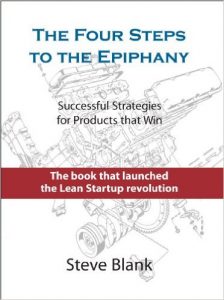
Why should I read it
It is best to learn from others’ mistakes. Steven Blank notices certain behavioral regularities that cause 9 out of 10 startups to fail. There are 10 mistakes that companies tend to make by basing their idea of customers and target market on intuition and gut-feel rather than learning and discovery. Whereas what they should really do is go outside the building and discover. This seminal book has paved the way to the Lean approach in business development.
Key message
The discovery of regular patterns resulting in startup failure, has led Steven Blank to a revelation: hidden in plain sight, there is a process pairing Product Development, which is often overlooked by entrepreneurs. He calls it Customer Development (the idea adopted and developed by many later researchers).
Learning about customers and their real needs is a four-step process that involves different procedures on each of the stages:
Customer discovery
- State hypothesis
- Test problem hypothesis
- Test product concept
- Verify
Customer validation
- Get ready to sell
- Sell to visionary customers
- Develop positioning
- Verify
Customer creation
Procedure depends on the market:
- Existing market
- New market
- Resegmenting existing market
- Low cost or niche
Company building
- Reach mainstream customers
- Management and culture issues
- Transition the customer development team into functional departments
- Build fast response departments
Key quotes
- “In a startup no facts exist inside the building, only opinions.”
- “In the early stages of a startup, focusing on ‘execution’ will put you out of business. Instead, you need a “learning and discovery” process so you can get the company to the point where you know what to execute.”
- “A good plan violently executed now is better than a perfect plan next week.”
The Lean Startup: How Today’s Entrepreneurs Use Continuous Innovation to Create Radically Successful Businesses, by Eric Ries (2011)
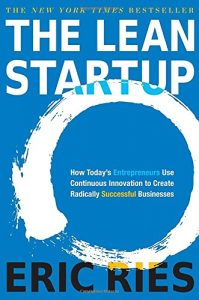
Why should I read it
One of the real case study books about tech startups. You will benefit from a scientifically based, yet clear and simple methodology of getting your idea implemented, hitting the target market and bringing revenue.
Eric Ries has proven once and for all that business success is brewed on precise analysis and smart decision-making rather than the uncontrollable creative process of a genius.
The author’s idea of ‘Lean Startup’ derives from Steven Blank’s concept of Customer Development combined with Agile methodologies of product development.
Key message
‘Continuous innovation’ is a key to success. It is a smart economical approach that allows creating something new in conditions of extreme uncertainty by understanding which processes work and which waste your resources and need to be disposed of.
The author managed to capture the dynamics of entrepreneurship – spiral development through the same stages of a learning process, constant business state analysis, taking timely decisions whether to persevere or pivot – all that is so important in today’s world of disruptive technologies and fits in with the paradigm of sustainable business management practices.
Key quotes
- “As you consider building your own minimum viable product, let this simple rule suffice: remove any feature, process, or effort that does not contribute directly to the learning you seek.”
- “Build-Measure-Learn feedback loop is at the core of the Lean Startup model.”
- “The big question of our time is not Can it be built? but Should it be built? This places us in an unusual historical moment: our future prosperity depends on the quality of our collective imaginations.”
Running Lean: Iterate from Plan A to a Plan That Works, by Ash Maurya (2012)
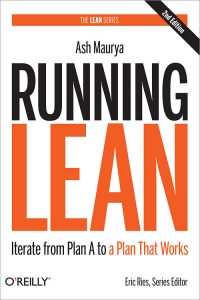
Why should I read it
You will find simple and efficient guidelines to planning, testing, and de-risking your business strategy – ‘distilled wisdom from startup world’s greatest minds’. The author’s hands-on experience of building Web Startups helped verify Steve Blank’ and Eric Ries’ ideas and creatively transform Alexander Osterwalder’s concept of Business Model Canvas into Lean Canvas.
Key message
What does ‘running lean’ imply? Success is about making informed and timely decisions, building great products and routinely de-risking and adjusting your business model.
Ash Maurya’s Lean Canvas embodies the principles of Lean startup. It’s handy for learning and testing hypotheses, allows for adjustments as the knowledge builds up. Startups that fail to ‘cross the chasm’ either lack knowledge or are too overwhelmed by it to make relevant timely decisions. Make it simple – follow a regular pattern:
- Document you plan (A-n)
- Identify the riskiest parts
- Understand the problem and define solution (problem/solution fit)
- Systematically test and derisk your plan – validate it qualitatively and verify quantitatively (product/market fit)
- If necessary, move on from plan A to another plan – that works
The second edition of the book – expanded and revised – stresses the need for live communication throughout the development cycle. Prioritizing, building a minimum viable product, having actionable metrics, regular vetting ideas – are all the ingredients of success.
Key quotes
- “Life’s too short to build something nobody wants.”
- “Startups that succeed are those that manage to iterate enough times before running out of resources.”
- “At every stage of the startup, there are a set of actions that are “right” for the startup, in that they maximize return on time, money, and effort. A lean/bootstrapped entrepreneur ignores all else.”
Lean Analytics: Use Data to Build a Better Startup Faster, by Alistair Croll & Benjamin Yoskovitz (2014)
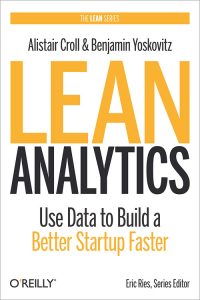
Why should I read it
Few books for tech startups will give a specific answer. How many metrics are enough? How to find your way through these numbers, graphs and pie charts? How to know whether to persevere, pivot, or quit? What metrics do you need at each stage? For your business? And what metric matters?
The authors of this one know. They cannot stress more the importance of relevant data to measure your progress. This is the last unknown in the ‘build-measure-learn’ cycle.
Key message
Though the book is aimed at helping startups with analytics basics, it covers a much larger audience. It gives you clues how to minimize the effort and maximize the gain of your marketing campaign: analyze your data by choosing a meaningful metric – one metric that matters – at every single stage of your campaign and within a particular online business type.
Key quotes
- “Many companies claim they’re data-driven. Unfortunately, while they embrace the data part of that mantra, few focus on the second word: driven. If you have a piece of data on which you cannot act, it’s a vanity metric.”
- “If you’re building for some kind of idealized, economically rational buyer, you’ll fail. But if you know your customers, warts and all, and you build things that naturally fit into their lives, they’ll love you.”
- “Getting paid is, in some ways, the ultimate metric for identifying a sustainable business model. If you make more money from customers than it costs you to acquire them — and you do so consistently — you’re sustainable. You don’t need money from external investors, and you’re growing shareholder equity every day.”
Well, that’s our choice of great books for tech entrepreneurs that will definitely enrich and inspire you. Some of those may well be deemed classics of startup, united by the ideas of discovery-driven planning, lean development and creating great products that people want.
What are your favourites? Share your choice with us.
Read also: Minimum Viable Product in Software Development: Getting It Right


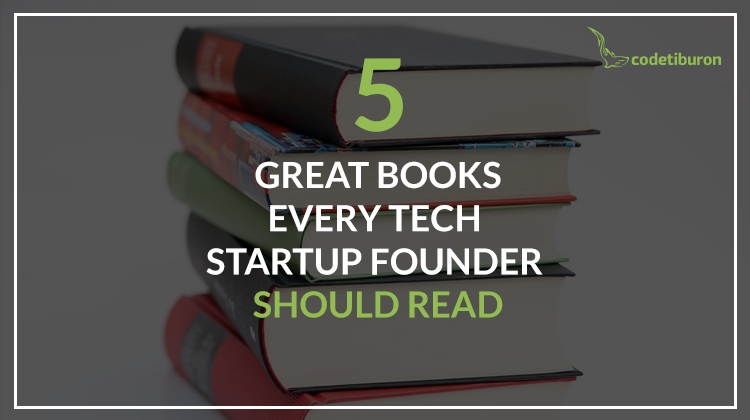
I guess this book should be on this list too
https://37signals.com/rework